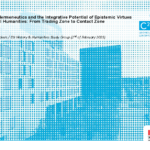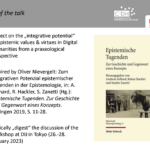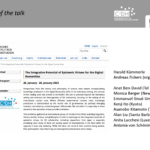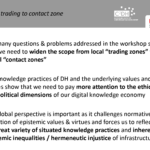
Download
Registration Info
This is a past event. Registration is no longer possible.
DIJ Mailing List
Please subscribe below to stay informed about our research activities, events & publications:
Digital Hermeneutics and the Integrative Potential of Epistemic Virtues in the Digital Humanities: From Trading Zone to Contact Zone
February 2, 2023 / 18:30h JST / 10:30h CET
Andreas Fickers, Luxembourg Centre for Contemporary and Digital History / DIJ Tokyo
Perspectives from the history and philosophy of science have helped conceptualizing knowledge production in the digital humanities (DH). In the laboratory setting, the concept of the trading zone has proved to be fruitful (Peter Galison). Arguing that DH tools can be considered as experimental systems in the sense of Hans-Jörg Rheinberger, the lecture aims at proceeding beyond the laboratory setting and embrace the heterogeneity of DH scholarship as an interdisciplinary field of research. Looking at the variety of experimental cultures in digital humanities, I’m interested in how different experimental cultures and communities of practice meet in concrete, or, in other words, how situated practices knowledge production are characterized by hermeneutics of in-betweenness. I argue that it is especially in situations of creative uncertainty and co-design of interdisciplinary research questions and projects that epistemic virtues can provide orientation. These virtues and values mold the scientific self and are labeled “epistemic” because of their perceived relevance to the pursuit of heuristic aims, helping to connect historical and present knowledge practices. How epistemic virtues and values are manifested in the design of databases, research tools, or visualizations and interfere in the research process more generally can is of key interest for the field of digital hermeneutics.
Based on the results of a two-day workshop at the German Institute for Japanese Studies, this lecture tried to integrate perspectives on epistemic virtues from the Global South, most notably those reflecting the decolonization of our current knowledge infrastructure and economy.
The event was attended by about 25 participants. One notable issue brought up in the discussion that followed the talk was how one could “teach” epistemic virtues. The point that “trading zone” and “broker” may sound as overtly affirmative of capitalism gathered special attention. On the other hand, invoking the “contact zone” without analytical caution may turn invisible the aspect of imperialism that featured present when it was coined.
Andreas Fickers is the director of the Luxembourg Centre for Contemporary and Digital History (C²DH) at the University of Luxembourg. He studied history, philosophy, and sociology at University RWTH Aachen (G) and Reims (F) and got his PhD in history of technology in 2002. His current research concentrates on experimental media archaeology and digital history & hermeneutics. He is editor of the Journal of Digital History and head of the Doctoral Training Unit “Deep Data Science of Digital History”. He is currently Scholar in Residence at the DIJ.



